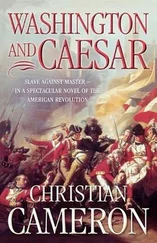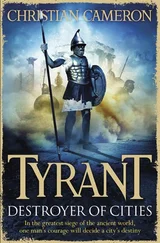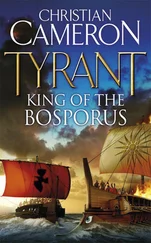Christian Cameron - Marathon - Freedom or Death
Здесь есть возможность читать онлайн «Christian Cameron - Marathon - Freedom or Death» весь текст электронной книги совершенно бесплатно (целиком полную версию без сокращений). В некоторых случаях можно слушать аудио, скачать через торрент в формате fb2 и присутствует краткое содержание. Жанр: Исторические приключения, на английском языке. Описание произведения, (предисловие) а так же отзывы посетителей доступны на портале библиотеки ЛибКат.
- Название:Marathon: Freedom or Death
- Автор:
- Жанр:
- Год:неизвестен
- ISBN:нет данных
- Рейтинг книги:3 / 5. Голосов: 1
-
Избранное:Добавить в избранное
- Отзывы:
-
Ваша оценка:
- 60
- 1
- 2
- 3
- 4
- 5
Marathon: Freedom or Death: краткое содержание, описание и аннотация
Предлагаем к чтению аннотацию, описание, краткое содержание или предисловие (зависит от того, что написал сам автор книги «Marathon: Freedom or Death»). Если вы не нашли необходимую информацию о книге — напишите в комментариях, мы постараемся отыскать её.
Marathon: Freedom or Death — читать онлайн бесплатно полную книгу (весь текст) целиком
Ниже представлен текст книги, разбитый по страницам. Система сохранения места последней прочитанной страницы, позволяет с удобством читать онлайн бесплатно книгу «Marathon: Freedom or Death», без необходимости каждый раз заново искать на чём Вы остановились. Поставьте закладку, и сможете в любой момент перейти на страницу, на которой закончили чтение.
Интервал:
Закладка:
Christian Cameron
Marathon: Freedom or Death
For the craftspeople who bring history to life — from vases to swords, horn cups to armour, kitchen knives to jewelry.
Glossary
I am an amateur Greek scholar. My definitions are my own, but taken from the LSJ or Routeledge’s Handbook of Greek Mythology or Smith’s Classical Dictionary . On some military issues I have the temerity to disagree with the received wisdom on the subject. Also check my website at www.hippeis.com for more information and some helpful pictures.
AkinakesA Scythian short sword or long knife, also sometimes carried by Medes and Persians.
AndronThe ‘men’s room’ of a proper Greek house — where men have symposia. Recent research has cast real doubt as to the sexual exclusivity of the room, but the name sticks.
ApobataiThe Chariot Warriors. In many towns, towns that hadn’t used chariots in warfare for centuries, the Apobatai were the elite three hundred or so. In Athens, they competed in special events; in Thebes, they may have been the forerunners of the Sacred Band.
ArchonA city’s senior official or, in some cases, one of three or four. A magnate.
AspisThe Greek hoplite’s shield (which is not called a hoplon!). The aspis is about a yard in diameter, is deeply dished (up to six inches deep) and should weigh between eight and sixteen pounds.
BasileusAn aristocratic title from a bygone era (at least in 500 BC) that means ‘king’ or ‘lord’.
BiremeA warship rowed by two tiers of oars, as opposed to a trireme , which has three tiers.
ChitonThe standard tunic for most men, made by taking a single continuous piece of cloth and folding it in half, pinning the shoulders and open side. Can be made quite fitted by means of pleating. Often made of very fine quality material — usually wool, sometimes linen, especially in the upper classes. A full chiton was ankle length for men and women.
ChitoniskosA small chiton , usually just longer than modesty demanded — or not as long as modern modesty would demand! Worn by warriors and farmers, often heavily bloused and very full by warriors to pad their armour. Usually wool.
ChlamysA short cloak made from a rectangle of cloth roughly 60 by 90 inches — could also be worn as a chiton if folded and pinned a different way. Or slept under as a blanket.
Corslet/ThoraxIn 500 BC, the best corslets were made of bronze, mostly of the so-called ‘bell’ thorax variety. A few muscle corslets appear at the end of this period, gaining popularity into the 450s. Another style is the ‘white’ corslet , seen to appear just as the Persian Wars begin — reenactors call this the ‘Tube and Yoke’ corslet , and some people call it (erroneously) the linothorax . Some of them may have been made of linen — we’ll never know — but the likelier material is Athenian leather, which was often tanned and finished with alum, thus being bright white. Yet another style was a tube and yoke of scale, which you can see the author wearing on his website. A scale corslet would have been the most expensive of all, and probably provided the best protection.
DaidalaCithaeron, the mountain that towered over Plataea, was the site of a remarkable fire-festival, the Daidala , which was celebrated by the Plataeans on the summit of the mountain. In the usual ceremony, as mounted by the Plataeans in every seventh year, a wooden idol ( daidalon ) would be dressed in bridal robes and dragged on an ox-cart from Plataea to the top of the mountain, where it would be burned after appropriate rituals. Or, in the Great Daidala , which were celebrated every forty-nine years, fourteen daidala from different Boeotian towns would be burned on a large wooden pyre heaped with brushwood, together with a cow and a bull that were sacrificed to Zeus and Hera. This huge pyre on the mountain top must have provided a most impressive spectacle; Pausanias remarks that he knew of no other flame that rose as high or could be seen from so far.
The cultic legend that was offered to account for the festival ran as follows. When Hera had once quarrelled with Zeus, as she often did, she had withdrawn to her childhood home of Euboea and had refused every attempt at reconciliation. So Zeus sought the advice of the wisest man on earth, Cithaeron (the eponym of the mountain), who ruled at Plataea in the earliest times. Cithaeron advised him to make a wooden image of a woman, to veil it in the manner of a bride, and then to have it drawn along in an ox-cart after spreading the rumour that he was planning to marry the nymph Plataea, a daughter of the river god Asopus. When Hera rushed to the scene and tore away the veils, she was so relieved to find a wooden effigy rather than the expected bride that she at last consented to be reconciled with Zeus. (Routledge Handbook of Greek Mythology , pp. 137-8)
DaimonLiterally a spirit, the daimon of combat might be adrenaline, and the daimon of philosophy might simply be native intelligence. Suffice it to say that very intelligent men — like Socrates — believed that godsent spirits could infuse a man and influence his actions.
DaktyloiLiterally digits or fingers, in common talk ‘inches’ in the system of measurement. Systems differed from city to city. I have taken the liberty of using just the Athenian units.
DespoinaLady. A term of formal address.
DiekplousA complex naval tactic about which some debate remains. In this book, the Diekplous , or through stroke, is commenced with an attack by the ramming ship’s bow (picture the two ships approaching bow to bow or head on) and cathead on the enemy oars. Oars were the most vulnerable part of a fighting ship, something very difficult to imagine unless you’ve rowed in a big boat and understand how lethal your own oars can be — to you! After the attacker crushes the enemy’s oars, he passes, flank to flank, and then turns when astern, coming up easily (the defender is almost dead in the water) and ramming the enemy under the stern or counter as desired.
DoruA spear, about ten feet long, with a bronze butt-spike.
EleutheriaFreedom.
EphebeA young, free man of property. A young man in training to be a hoplite . Usually performing service to his city and, in ancient terms, at one of the two peaks of male beauty.
EromenosThe ‘beloved’ in a same-sex pair in ancient Greece. Usually younger, about seventeen. This is a complex, almost dangerous subject in the modern world — were these pair-bonds about sex, or chivalric love, or just a ‘brotherhood’ of warriors? I suspect there were elements of all three. And to write about this period without discussing the eromenos/erastes bond would, I fear, be like putting all the warriors in steel armour instead of bronze. .
ErastesThe ‘lover’ in a same-sex pair bond — the older man, a tried warrior, twenty-five to thirty years old.
EudaimoniaLiterally ‘well-spirited’. A feeling of extreme joy.
ExhedraThe porch of the women’s quarters — in some cases, any porch over a farm’s central courtyard.
HelotsThe ‘race of slaves’ of Ancient Sparta — the conquered peoples who lived with the Spartiates and did all of their work so that they could concentrate entirely on making war and more Spartans.
Читать дальшеИнтервал:
Закладка:
Похожие книги на «Marathon: Freedom or Death»
Представляем Вашему вниманию похожие книги на «Marathon: Freedom or Death» списком для выбора. Мы отобрали схожую по названию и смыслу литературу в надежде предоставить читателям больше вариантов отыскать новые, интересные, ещё непрочитанные произведения.
Обсуждение, отзывы о книге «Marathon: Freedom or Death» и просто собственные мнения читателей. Оставьте ваши комментарии, напишите, что Вы думаете о произведении, его смысле или главных героях. Укажите что конкретно понравилось, а что нет, и почему Вы так считаете.












